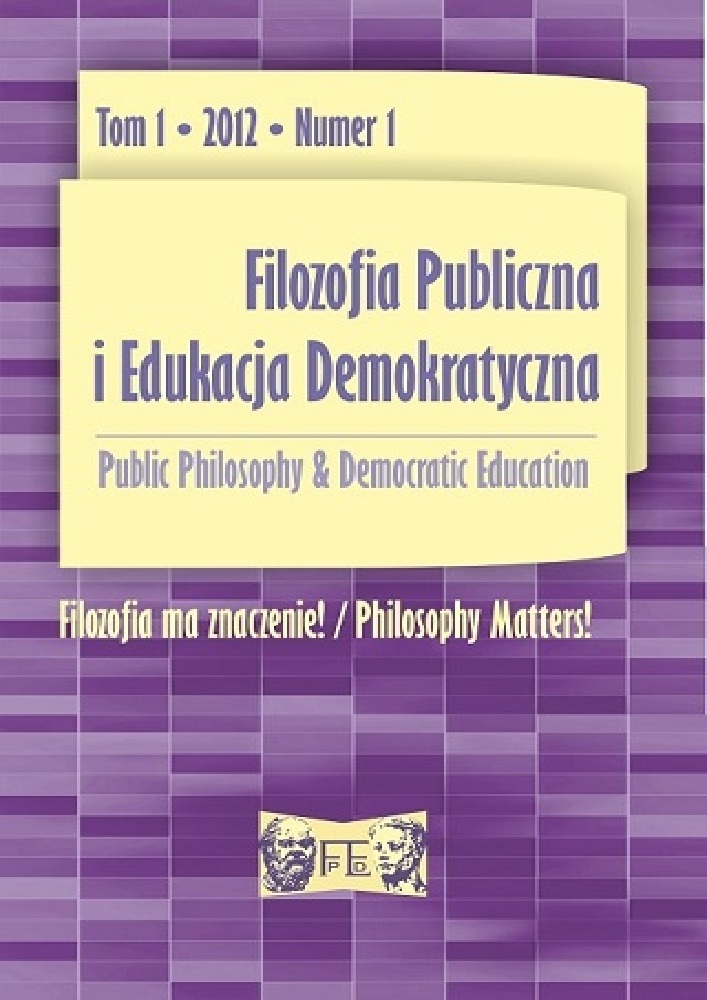Abstrakt
In this chapter I focus on the relevance of moral emotions in our „perception of something as moral issue” as well as „in the application of moral norms, but also in their grounding…”1. Referring to the statements of philosophy (from Aristotle to Habermas) and developmental psychology (from Piaget to Ekman) I highlight that affectivity needs to be already promoted in the early education. There is a lack of the professional emotional education in the Polish schooling system. Finally I propose a simple training for both teachers and students, in order to strength their skills of understanding facial emotional expressions of others. Mutual respect, trust, and better communicational relationships in the classroom will follow, and, last but not least, the learning processes in pupils will be facilitated too.
Bibliografia
Beane J., Affect in the curriculum: towards democracy, dignity, and diversity, Teachers College Press, New York 1990.
Boler M., Disciplined emotions: philosophies of educational feelings, “Educational Theory” Vol. 47 (1997), Issue 2, s. 203–225.
Gibbard A., Wise choices, apt feelings. A theory of normative judgment, Clarendon Press, Oxford 1990.
Habermas J., Autonomy and solidarity. Interviews with Jürgen
Habermas, P. Dews (ed., introd.), Verso, London 1985.
Honneth A., Das Ich im Wir. Studien zur Anerkennungstheorie, Suhrkamp, Frankfurt/M. 2010.
Honneth A., Unsichtbarkeit. Stationen einer Theorie der Intersubjektivität, Suhrkamp, Frankfurt/M. 2007.
Lipman M., Caring thinking, Paper presented to the 6th International Conference on Thinking, MIT, Boston 1994.
Martens E., Dzieci są filozofami, filozofowie są dziećmi, przeł. E. Nowak, „Ethics in Progress Quarterly” 2011, nr 2, www.ethicsinprogress.org.
Nowak E., Ethics in progres, WN IF UAM, Poznań 2010, e-book: https://repozytorium.amu.edu.pl/jspui/handle/10593/592.
Nussbaum M., Emotions as judgments of value, “The Yale Journal of Criticism” Vol. 5 (1992), Issue 2, s. 201–212.
Piaget J., Psychologie et pédagogie, Gouthier, Paris 1969.
Ratcliffe M., Feelings of being. Phenomenology, psychiatry, and the sense of reality, Oxford Univ. Press, New York 2007.
Schore A.N., Affect regulation and the origin of the self, Lawrence Erlbaum Associates, Hillsdale, New Jersey 1994.
Selman R., The growth of interpersonal understanding, Academic Press, San Francisco 1980.
Sharp A.M., The classroom community of inquiry and the education of the emotions, w: D.G. Camhy (ed.), Philosophical foundations of innovative learning, Academia, Sankt Augustin 2007.
Solomon R., Emotions as judgments, w: The passions, Notre Dame University Press, Indiana 1983.
Souza de R., The rationality of the emotions, w: A. Rorty (ed.), Explaining Emotions, Univ. of California Press, Berkeley 1980.
Stamm I., Zwischen Neurobiologie und Sozialethik, BIS-Verlag der Universität Oldenbourg, Oldenbourg 2007.
Wygotski L., Denken und Sprechen, Conditio Humana, Fischer, Stuttgart 1972.
Zajonc A., Cognitive-affective connections in teaching and learning: the relationship between love and knowledge, „Journal of Cognitive Affective Learning” 2006, no. 3(1), Fall, s. 1–9, https://www.jcal.emory.edu//viewarticle.php?id=82&layout=html.
Ben-Ze’ev A., The subtlety of emotions, MIT Press, Cambridge 2000.
Licencja
Prawa autorskie (c) Autorzy zachowują prawa autorskie i prawa do publikacji swoich artykułów w tym czasopiśmie, przyznając czasopismu prawo do ich rozpowszechniania na warunkach CC BY-NC-ND 4.0

